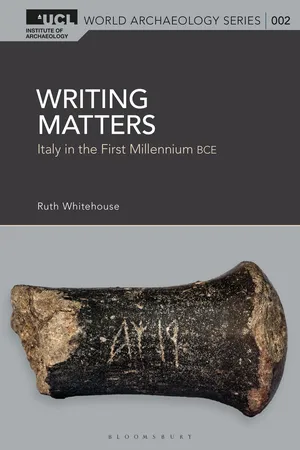
- 296 pages
- English
- ePUB (mobile friendly)
- Only available on web
About This Book
The epigraphy of 1st-millennium-BCE Italy has been studied for many years, but these studies have largely concentrated on the languages encoded in the inscriptions and their semantic meanings. This book takes a more holistic approach that looks not only at content, but also the archaeological contexts of the inscriptions and the materiality of their 'supports': the artefacts and monuments on which the inscriptions occur. The first writing in Italy was not a local invention, but was introduced by the Phoenicians and Greeks in the 9th–8th centuries BCE. It was taken up by number of indigenous communities over the subsequent centuries to write their own languages, before these were eventually submerged by the spread of Latin. In a series of theoretical, methodological and interpretative essays, Ruth Whitehouse explores what can be learned about how writing was used by these communities and what it meant to them. The bodies of data considered relate to Venetic and Raetic (the northeast), Lepontic (the northwest), Messapic (the southeast) and Etruscan (west central Italy, extending also into Campania in the south and the Po plain in the north). While not a comprehensive survey, there are enough different groups to allow a comparative approach to be adopted. Analysis of the datasets is able to reveal the similarities and differences between them, as well as identify features that were widespread in 1st-millennium-BCE Italy and others that were more idiosyncratic and specific to particular cultural groups. Placing materiality at the centre of study allows a reconsideration of the roles writing played in the lives of the individuals and groups who occupied Italy in the 1st millennium BCE.
Frequently asked questions
Information
Table of contents
- Cover
- Half-Title Page
- Series Page
- Dedication
- Title Page
- Contents
- List of Figures
- List of Tables
- Acknowledgements
- Series Preface
- Prologue: Aim of the Book
- 1 Introduction
- 2 Approaches to The Study of Writing
- 3 A Material Typology
- 4 Archaeological Context, Materiality and Content in the Italian Databases
- 5 Agency and Production: A Chaîne Opératoire Approach
- 6 What Difference Does Writing Make?
- 7 Objects That Speak
- 8 The Ritualization of Writing
- 9 What’s in a Name?
- 10 Gender, Writing and Objects
- 11 Writing in Society
- 12 Conclusions
- Notes
- References
- Index
- Copyright